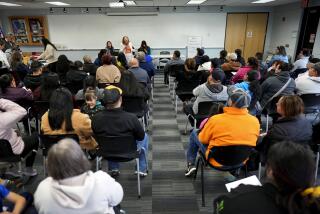Layoffs are driving change among the Amish
- Share via
GOSHEN, IND. — The Amish are defined by their religious beliefs, shunning automobiles, insurance and electricity in their homes.
But some in hard-hit northern Indiana realize they can no longer avoid one modern idea: unemployment checks.
The Amish church frowns on government aid, but it relented on unemployment checks after a wave of layoffs stung laborers in this settlement about 90 miles south of Indianapolis. Church leaders justified the decision because workers are collecting on the unemployment taxes they paid into the system.
“No one says go out and do it,” said Eli Miller, 72, an Amish bishop who also prepares income tax returns. “But when they have to feed their families, we thought it would be OK to accept some of it, even though we would rather not.”
The March unemployment rate in LaGrange and Elkhart counties, where much of Indiana’s Amish population is concentrated, stands near 19%, about 4 percentage points higher than in Wayne County, Mich., home to Detroit and the American auto industry.
More than half of all Amish men here work in factories, a trend that accelerated over the last two decades, according to an analysis by Steven Nolt, a history professor at Goshen College. Increasing land prices and a growing population made it nearly impossible for farming alone to sustain the Amish community, so the men found steady salaries in assembling recreational vehicles, an industry socked over the last year by high fuel prices and then the credit crunch.
The job situation is dire enough that Larry Herschberger, a 27-year-old Amish man let go last May by RV builder Jayco Inc., went a step beyond receiving unemployment. He began worshiping as a Mennonite, a denomination that allows its followers to drive cars. That decision, as well as one to purchase a 1999 Chevy Tahoe, frustrated his family and in-laws.
“It’s been hard,” said Herschberger, shrugging his shoulders.
“If I got to make a living, I’ve got to drive,” he said, sitting in a booth at the 5 & 20 Country Kitchen in Shipshewana, Ind., where his wife once was a waitress.
The restaurant sits at Indiana State Road 5 and U.S. Highway 20, but it might as well be at the crossroads of the Amish and mainstream America. “California Dreamin’ ” by the Mamas and the Papas played as waitresses in bonnets served plates of fried chicken. Herschberger currently draws a paycheck as a handyman for the restaurant’s owner, who also has several rental houses and a business assembling boat trailers.
Other laid-off Amish want to stay within the faith. Several have sought work at the Country Woodshop in Goshen.
“I don’t even write down the applications anymore, I’ve had so many people,” said its Amish owner, Noah Bontrager, who spent 11 years building RVs before launching his company.
Bontrager cannot afford new hires. Orders for his hardwood tables are off by 30%, so Bontrager had to shave a day off the five-day workweek. His shop has 18 Amish craftsmen and two non-Amish employees, one to manage the e-mail and Internet and the other to drive the delivery truck.
Between sunrise and 2 p.m. quitting time, the craftsmen can saw, hammer, sand and stain 31 dining room tables. Stores as far as Alaska and Florida sell the tables, which retail from $750 to $2,200.
As long as the economic picture doesn’t worsen, Bontrager figures he will not need to fire anyone. Yet he recognizes that businesses such as his must expand to fill the permanent employment void left by closed RV factories.
“Our goal would be to have this be the furniture belt for America,” Bontrager said.
The Amish have adapted to economic crises before. During the Depression, some men were permitted to register for driver’s licenses, according to research by Nolt. That special exemption is less likely to happen this time, the professor said, because the Amish have come to view the horse and buggy as core parts of their identity.
This recession is especially brutal because the Amish factory workers became accustomed to earning annual salaries of $60,000 to $100,000, which provided for mortgages and shopping trips. A fiberglass basketball hoop hangs above a buggy in one driveway. The Wal-Mart has a hitching post. And some Amish men are as attached to their cellphones as their beards.
Gary Zehr, the LaGrange County economic development director, said the recession was forcing the Amish to reconsider their careers: “Here’s how an Amish guy put it to me: ‘All of the sudden, we’ve got to use our brains again.’ I think what he meant was that you have to think about how you will support your family, instead of just going to work.”
In past downturns, the jobless simply scratched around to find other work. This recession has cut much deeper, said Herschberger, who had worked at Jayco since February 2001. The initial round of layoffs at Jayco involved recent hires, so the Amish elders did not see a reason for anyone to collect unemployment until the layoffs spread, he said.
“A lot of the older guys dragged their feet on unemployment, until they saw the younger guys couldn’t make it,” Herschberger said. “Several people were like, ‘We can live off the land again.’ The old people have to accept that times have changed.”
--
More to Read
Sign up for Essential California
The most important California stories and recommendations in your inbox every morning.
You may occasionally receive promotional content from the Los Angeles Times.













